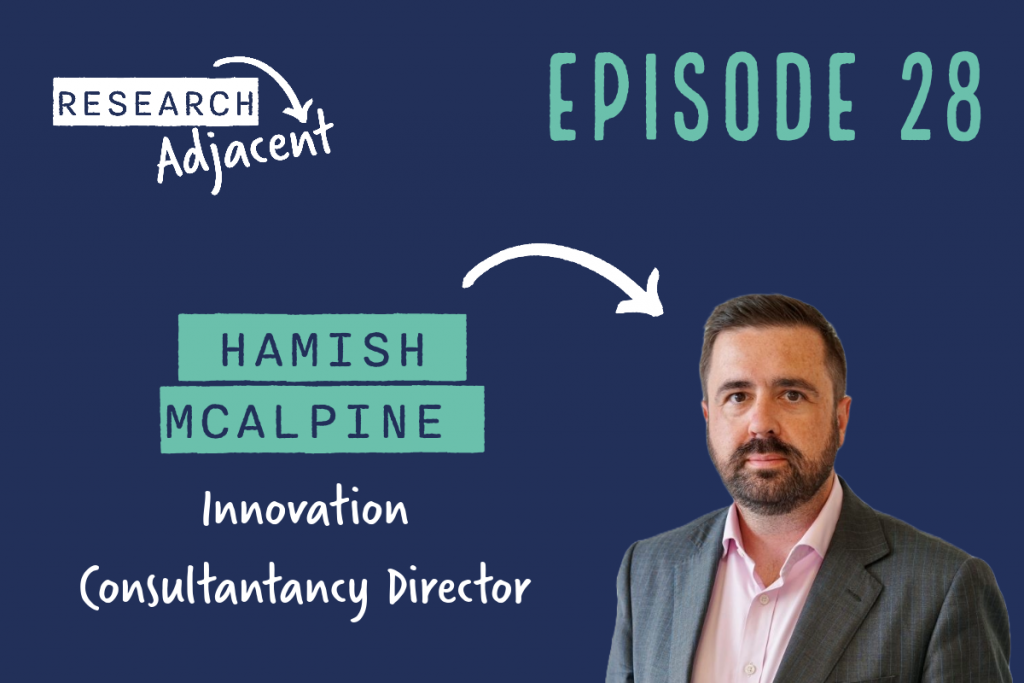Hamish McAlpine, Innovation Consultancy Director (Episode 28) | Hamish is facilitating ‘impact at scale’

For this episode of the Research Adjacent podcast Sarah is talking to Hamish McAlpine, Director for Policy and Engagement at Oxentia Ltd. Oxentia provides practical and strategic support for organisations like universities to help them turn research into real world innovations.
Motivated to make a difference
Hamish originally trained as an engineer and was lured into research as a way of staying in Bath, the city he’d fallen in love with as an undergraduate. This then led to roles in research management, then research policy, then ultimately consultancy.
“Whether you call it research impact or knowledge exchange or engagement or whatever language we use. I think the idea of helping people translate what they’re doing in something which has economic, societal, environmental or health benefits is a really great thing to do. It’s very rewarding.”
Knowledge exchange by any other name
Knowledge exchange is the thread running through Hamish’s career. Indeed, during his time at HEFCE and Research England Hamish led on creating the first Knowledge Exchange Framework, or KEF. This framework is designed to help universities capture and improve their knowledge exchange activities. Hamish’s time thinking long and hard about knowledge exchange has led to perhaps a broader concept of the term than most people.
“When I talk about knowledge exchange, I simply mean any interaction that an academic or a student or university has with someone who’s not another academic. I have increasingly conceptualised knowledge exchange and commercialisation as just a pathway to impact – you’ve got some money, you do something, you get some outcomes that leads to some impact. Knowledge exchange is just the activity you do.”
Impact at scale
This broad concept of knowledge exchange also means that it can apply to lots of different areas of research – not just those usually associated with commercialisation.
“If you’re a scientist, commercialisation is probably quite a familiar concept. If you’re a historian, a psychologist, if you’re working in education, maybe it means less or maybe it’s even actively off-putting. But commercialisation doesn’t mean for-profit necessarily. There are lots of really great models like not-for-profit companies or franchising, setting it up in such a way that you’re getting your research out there. We’re increasingly talking about commercialisation in the SHAPE disciplines as ‘impact at scale’.“
Considering the KEF
Despite feeling proud of the work he did on the KEF Hamish has still agonised over whether, on balance, it is a good thing.
“It’s great to see where it’s created positive change. That it’s given knowledge exchange professionals visibility and this sort of ‘parity of esteem’ compared to research and teaching. And the output of the KEF is a very visual thing. It gives them something they can slap in front of the Vice Chancellor and say, we need to do better. But when you’re doing something that affects the whole sector it kind of tortures you a bit. You think, am I doing the right thing? Are we going to do more harm than good? There’s a real responsibility to get it right.”
Wrangling elephants and data
Since coming to Oxentia, Hamish has noticed that the pace and variety of the work he does has changed. In discussing the challenges of creating change in the university sector he says:
“There’s merit in taking your time and doing something right. But I won’t lie and say that I wasn’t frustrated. I can’t quite remember who said it, but there’s a quote – ‘Getting a university to change is like guiding an elephant on the end of an elastic band. You can pull very carefully and the elephant, moves very slowly. But if you pull too hard the elastic band snaps and the elephant wanders off in a different direction.'”
He is also frustrated that sometimes decision making is hampered by a lack of data and would use his Research Adjacent magic wand to effortlessly gather all the data he could possibly need.
Find out more
- Connect with Hamish on LinkedIn or Twitter
- Find out more about Oxentia
- Hamish worked on the first iteration of the Knowledge Exchange Framework – learn more about it here
Theme music by Vitaliy Levkin from Pixabay
Join our gang! Sign up to our mailing list
Are you a current or aspiring research-adjacent professional? Or are you just research-adjacent curious? It doesn’t matter, everyone is welcome in our gang! Join our mailing list using the form below and you will receive podcast updates (of course) plus interesting articles, reports, career tips and resources. You can unsubscribe any time.